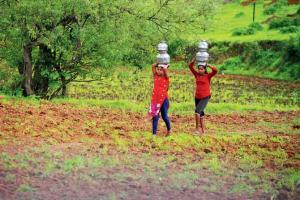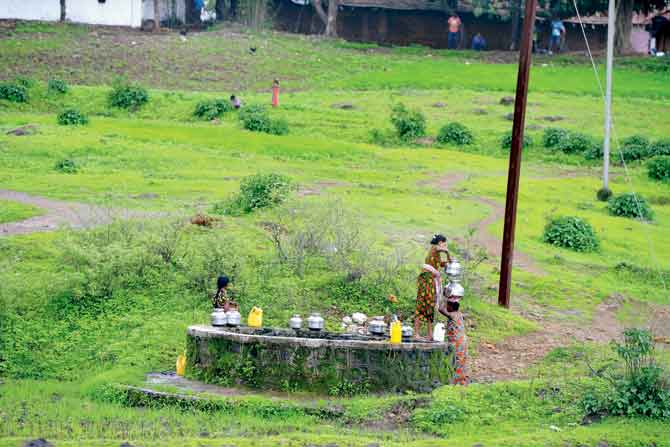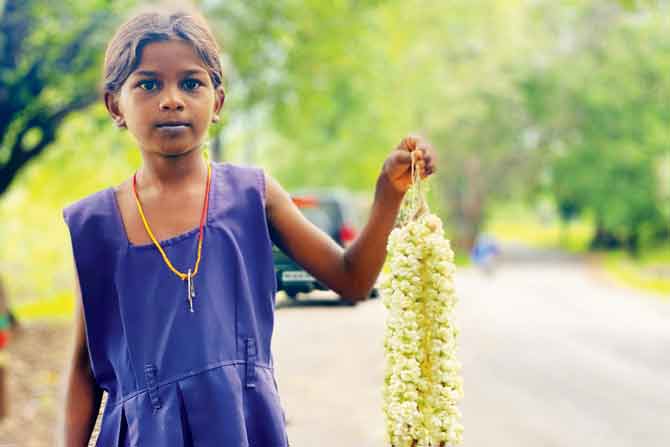
Tribals have to walk 4 km to fetch drinking water from wells and 8 km in another direction to wash clothes. Pic /Hanif Patel
mid-day's front page report, 'Palghar tribals hit by acute food shortage,' on Thursday caught the attention of the government, with the Secretary, state Tribal Development Department, Vinita Vaid-Singhal taking cognisance of the issue. "We have taken note of the report. It is good that the issue has been raised. We are extremely sensitive to the needs of the tribals. Whatever corrective measures are required, we will take them," said Vaid-Singhal
But while the government has assured action regarding the food problem, it also needs to look at the other issues the tribals face. The interior hamlets of Palghar District record high rainfall during the monsoon, yet the tribal communities suffer due to acute shortage of water for drinking and cleaning purposes. mid-day witnessed many women, young girls balancing pots on their heads to fetch water from a well located miles from their villages.
The chairman of a government-appointed committee to look into the status of schemes for tribals in Maharashtra, Vivek Pandit, said that the tribal population relies on wells for water.
A farmer, Kamlakar S Bhore, a tribal residing in Namgarmoda village of Jawhar Taluka, told mid-day that they have to walk 1.5 km to fetch drinking water from wells and 8 km in another direction to wash clothes from streams. "The conditions are bad. It is an arduous task to get water for drinking and washing clothes. We live in a hilly region and it is exhausting to walk while carrying heavy pots filled with water," Bhore told mid-day.
Issue intensifies in summer
The tribals residing in Washala village were seen collecting rain water to clean utensils and clothes. "There is no scarcity of water if it rains. We have to travel only 1.5-km to fetch the water. But the situation deteriorates during March, April and May as the water level in the well falls at alarming rates and then we have to walk 4-km to fetch water when it dries," said Narayan Khandu Zombad, whose neighbour was seen collecting rain water.
 It is an exhausting walk for many to fetch water from wells
It is an exhausting walk for many to fetch water from wells
"This is a hilly area and last year this region had recorded higher rainfall than Cherrapunjji. But the rainwater is wasted as the region is hilly. In a bid to provide water to tribals, the Government of Maharashtra started a scheme called Thakkar Bappa Yojana (TBY) in 2004-05 for integrated development of tribal habitations through community-level works. Under the scheme, wells are dug near their villages to make arrangement of water for tribals," Prajit Nair, Sub-Divisional Magistrate told mid-day.
"It is true that a few tribal villages are still deprived of TBY. Mokhada taluka is a water stressed region in Palghar District where we ensure that tankers supply water in co-ordination with tahsildar and block officials," said Nair, adding, "A water tanker is the only lifeline for people residing in Mokhada taluka. The water is emptied in the well and thereafter the villagers gather there to fetch it using ropes and buckets."
"The contractor of water tankers has been asked to install GPS in the vehicles so that we can monitor how much water has been supplied to needy tribals. The daily report of water supply by tankers is maintained electronically," Nair added.
Despite the TBY, some tribals have to walk miles to fetch water. "If the contractor does not supply the required quantity of water to them, the villagers report to the gram panchayat and then the matter comes to us and we take strict action against the contractor. Sometimes, there is a nexus between the gram panchayat and contractor and the tribals residing in water stressed regions have to suffer," Nair told mid-day.
Speaking about the water scarcity, Pandit said, "I have been requesting the government to make dams in the region. But no one is paying heed to my request. Jawhar and Mokhada talukas record high rainfall every year but the water is lost because the area is hilly."
Kids giving up education
The literacy rate among tribals in Jawhar and Mokhada talukas is also the worst as most of the children have not gone to school. Seven-year-old Nandini, whose mother Mangla Wagh committed suicide after killing her other three-year-old daughter due to utter poverty, has never been to school.

Many of the tribal kids sell flowers to earn some money. Pics/Hanif Patel
Sita Shankar Ghatal, who is in-charge of the Vitthu Maoli Charitable trust where malnourished children and their mothers are treated free of cost, said "Many children give up studies due to the sheer effort of walking 8 km to and fro the nearest school. They cannot walk 16 km every day.
She also told mid-day that there are six types of tribes including Kokna, Varli, Ka-Thakur, Ma-Thakur, Katkari and Dharkoli in Jawhar and Mokhada Talukas. "Among these six, the Katkari and Dharkoli tribals are extremely poor. Most of the tribals leave their villages in October to work in brick kilns at Bhiwandi, Vasai, Nalasopara, etc with their children as there is no other work to earn money. They return to their villages in May to work in the field to grow paddy, and the kids also work with them," Ghatal said.
"How will the children study if they are out with their parents for eight months to work? The literacy rate is negligible. Had there been an industry in these areas, the tribals would not migrate from their villages to earn," she said.
A group of tribal children was seen selling flowers and gajra (small flower garlands) to earn money. Tribal leader Pandit said, "The area has the potential to become a tourism hotspot. But no government paid attention to this to help uplift us tribals. Jawhar and Mokhada are hilly regions. The floriculture industry can also help tribals a lot."
"On the one hand the government talks about women empowerment, but the pregnant tribal women are being deprived of nutritious foods. Palghar is adjacent to Mumbai but there are other tribal areas in the interiors of Maharashtra. If the conditions of tribals residing in Palghar are so deplorable, one can imagine what the conditions of tribals living in the remotest areas would be. The state government must act immediately to safeguard the rights of tribals," said Chitra Wagh, vice president, Maharashtra BJP.
Catch up on all the latest Mumbai news, crime news, current affairs, and a complete guide from food to things to do and events across Mumbai. Also download the new mid-day Android and iOS apps to get latest updates.
Mid-Day is now on Telegram. Click here to join our channel (@middayinfomedialtd) and stay updated with the latest news
 Subscribe today by clicking the link and stay updated with the latest news!" Click here!
Subscribe today by clicking the link and stay updated with the latest news!" Click here!









